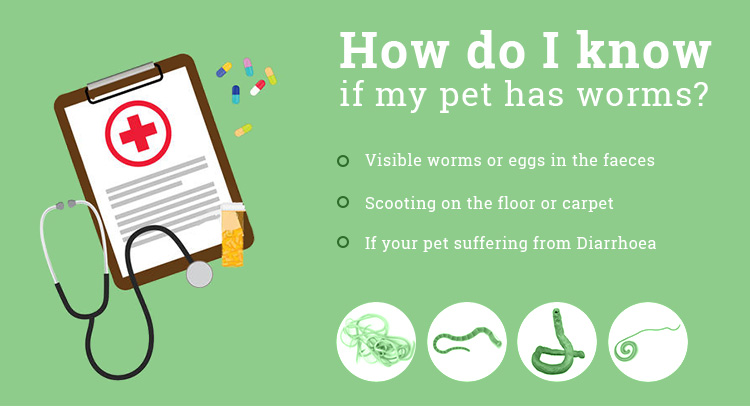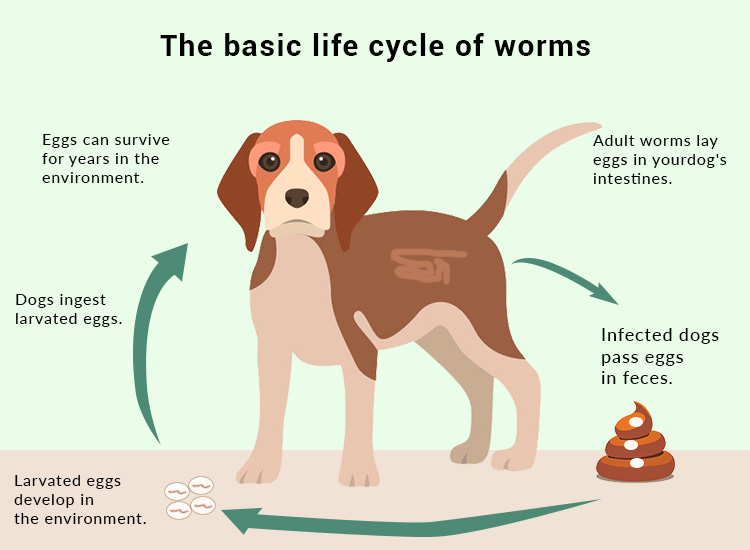-
Popular Brands View All BrandsPopular Brands View All BrandsPopular Brands View All BrandsPopular Brands View All BrandsPopular Brands View All Brands
- Dogs
- Cats
- Brands
- New Arrivals
- Below R150
- Refer & Save More
- Summer Season Sale
Aug 13, 2018

Deworming is an important step in ensuring the health of your pet. Worms cause gastro-intestinal upsets, such as vomiting, diarrhoea, loss of appetite and blood in the stool.
Some owners have the misconception that if their pet’s stool is normal, their pet has no worms. Often worms are not visible unless there is a huge worm burden. Their eggs are microscopic so you won’t be able to see them with the naked eye. It’s a good thing to take note of your pet’s faeces as this can provide valuable information as to what is happening inside your pet’s intestinal tract. If your pet suffers from diarrhoea, if there is any blood or if you are concerned it is advisable take a stool sample to your local vet for analysis. This allows your vet to do what’s known as a faecal float which checks for worm eggs.

Other signs that may indicate your pet has worms includes:

Worm eggs are found in the environment (such as in the soil) and are ingested by the pet. These eggs hatch inside the pet’s intestines and become adult worms. These adult worms feed off the host and lay new eggs. These eggs are shed in the pet’s faeces and re-infect the environment. The eggs can survive for weeks, even years, in the environment.
These worms have hook-like mouth parts which allow them to anchor onto the intestinal wall. They ingest large amounts of blood and can cause anaemia. With a heavy worm burden they can be life threatening. Puppies can get infected through suckling, making it important to have strict worm control and hygiene.
Dogs and cats can also become infected by the larvae of the worm penetrating through the pet’s skin.
People can also be infected by hookworm.
These worms are typically transmitted by fleas. If you find fleas on your pet, treat the flea problem and deworm. These worms cause digestive upsets and can stunt the growth of puppies.
The Echinococcus species of tapeworm can infect people.
This is one of the most common worms found in cats. They are found freely in the intestine, unlike the hook worm. In small numbers they can go undetected as the pet doesn’t usually show any clinical signs of infection.
These worms can cause poor growth in puppies and kittens if left untreated. Puppies and kittens typically have a potbelly-like appearance when infected with large numbers of roundworms.
Roundworms can also infect people.
These worms live in the large intestine where they cause irritation and inflammation of the intestine. This causes watery, and sometimes bloody, diarrhoea.
This worm acts very differently to the typical intestinal worm as it has a different lifecycle and a different set of clinical signs other than the usual intestinal upsets.
This is becoming a very serious problem in certain parts of South Africa and deserves an article of its own to develop a greater understanding of its effects.
An important point to mention is that not all deworming medication targets this worm, most don’t. Only the oral drug Milbemax and the topical Adovocate can help in controlling and treating this parasite, provided the Milbemax is given every 28 days and the Advocate is applied monthly.
You may have heard about heart worm but (thankfully) this worm is not found in South Africa. If your pet has come from overseas, they may have been susceptible to it and should have been treated before being allowed to enter South Africa.
Puppies and kittens should be dewormed at 2, 4 and 6 weeks of age. Thereafter, deworming should generally be done on a monthly basis or as prescribed by your local vet.
Adult dogs should be dewormed every 28 days to prevent spirocercosis. Previously, it would be recommended that treatment occur every 3 to 4 months but now Spirocercosis is becoming more common and can be fatal. The only way to prevent this disease is to deworm every 28 days with Milbemax or apply topical Advocate.
Deworming regularly prevents family members, including you, from falling sick, especially as some worms can be transmitted to humans.
Hygiene is very important to control worms.
Regularly cleaning up and disposing of faeces should be done.
Washing and disinfecting water and food bowls daily can also prevent the spread of worms.
Wash your hands properly before eating.
Educate your children about the importance of hygiene in preventing the spread of worms.
| Brand | Roundworm | Tapeworm | Whipworm | Hookworm | Heartworm | Fleas |
|---|---|---|---|---|---|---|
| Drontal Tablets |

|

|

|

|

|

|
| Milbemax (Chewable) |

|

|

|

|

|

|
| Advocate (Spot On) |

|

|

|

|

|

|
| Revolution |

|

|

|

|

|

|
Dog Intestinal worm and Heartworm products - comparison chart
* This table gives simplified product -comparison information only. You should carefully read the individual product information to be sure the product is right for your pet.| Brand | Roundworm | Tapeworm | Whipworm | Hookworm | Heartworm | Fleas |
|---|---|---|---|---|---|---|
| Drontal Tablets for cats |

|

|

|

|

|

|
| Milbemax Chewable |

|

|

|

|

|

|
| Profender Allwormer for cats Spot-on |

|

|

|

|

|

|
| Advocate Spot on For cats |

|

|

|

|

|

|
| Revolution for cats |

|

|

|

|

|

|
Cat Intestinal worm and Heartworm products - comparison chart
* This table gives simplified product -comparison information only. You should carefully read the individual product information to be sure the product is right for your pet.Also Read: Natural Remedies for Deworming Dogs at Home
Dec 04, 2025
Christmas, the most awaited and joyous time of the year, has almost arrived! The flowers are in full bloom, and the Christmas carols have a...
Nov 25, 2025
Fleas and ticks are a serious threat to your dog’s health, as they can cause significant discomfort and transmit diseases. Contrary t...